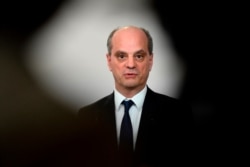The report was explosive. Sixteen years ago, one of France’s top education officials, Jean-Pierre Obin, sounded what he hoped would be a wake-up call about the "Islamization of French public schools."
But the report was buried.
Obin was indignant then and is even more so now after the beheading last Friday of a high school teacher on the outskirts of Paris following a social-media campaign targeting him for showing cartoons of the Prophet Muhammad to his students.
“I am horrified,” Obin told Le Journal du Dimanche in an interview. “I feel both sadness and the anger of someone who saw this coming from afar,” he added.
He says for a decade and a half, French schools have been in denial and officials have been “closing their eyes instead of facing reality.”
Only last month the now-retired Obin published a book: “How Did We Let Islamism Penetrate Schools?” The book is likely now to become a bestseller in the wake of Friday’s murder of Samuel Paty, a well-liked history and geography teacher, by Chechen-born Abdullakh Anzorov, 18.
On Monday, French police raided the homes of dozens of radical Islamists in the French capital, arresting among others the radical cleric Abdelhakim Sefraoui, for incitement. Gérald Darmanin, France’s interior minister, said Monday that the targets of the raids were not suspected of involvement in the murder but were known activists. “We have the clear intention of passing a message. There will not be a minute’s respite for enemies of the republic,” he said.
More than 80 investigations have been opened also into online hate speech involving messages of sympathy for Anzorov after he travelled 80 kilometers from his home in Normandy to Paty’s school in the suburb of Conflans-Saint-Honorine.
There, the Chechen teenager launched his attack with a knife, subsequently posting on Twitter a photograph of the teacher’s severed head. Anzorov was later shot dead by police.
Early warnings
Obin drafted his report raising the alarm about Islamization when he was France’s inspector general of education. He studied 61 schools in 24 French departments, noting that many Muslim students did not acknowledge their nationality as French and invariably answered when asked that they were Muslim.
He explained many Muslim students lauded Osama Bin Laden and see him as a hero. He said that the signs of racial indoctrination were evident even at elementary schools with Muslim students refusing to sing, dance or draw faces. Some students refused to use the plus sign because they considered it a Christian symbol.
And he warned the indoctrination orchestrated was being orchestrated by international religious organizations and foreign imams, accusing them of blatant efforts to hinder integration and create parallel separatism.
Many in France consider Obin a methodical, non-partisan technocrat, who in his 2004 report and since has endeavored to describe Islamization in France’s public schools without using grand rhetoric. Recent polling data examining the thinking of young Muslims has given even greater credence to his analysis, as has polling of teachers. A recent FIFG poll found that around 74 percent of Muslims under the age of 25 put their religion ahead of the state.
Obin told Le Journal du Dimanche that he hopes at least some good will come out of Paty’s murder, saying he believes, “This attack is a symbolic turning point.”
But he is fuming about the lost years when the French government could have done more to combat radicalization and to stop the country’s schools becoming a religious battleground. Since he delivered his shunned report, the crisis has only worsened, he says, with primary schools being affected even more than 16 years ago. He wrote the book “to alert citizens to the multiple and recurring attacks on secularism that are developing in public education.”
In the book, Obin says teachers are being intimidated by Muslim parents and clerics. Incidents he cites include Muslim parents complaining about a teacher reading the “Three Little Pigs” story. He reports about how some Muslim students refused to enter a classroom because it was painted red. In some preschools, he reports, toddlers have decided Muslims and non-Muslims should use different taps.
Around a third of teachers admit they self-censor to avoid trouble from students, parents or their local Islamic community. Some are especially wary about teaching American history or literature.
Last month, the country’s education minister, Jean-Michel Blanquer, praised Obin’s book in Le Point magazine, saying there are forces at work trying to “impose a model of society that is not ours.” “There was no complicity at the state level, but a form of passivity which I put an end to since 2017,” he said.
But counter-terror analyst Olivier Guitta, who runs GlobalStrat, a London-based risk consultancy, is critical of the pace of government action since 2017. And he is sympathetic to Obin’s lament of the wasted years since his 2004 report.
“Today, the situation has actually deteriorated and became much more widespread,” said Guitta. “As Obin recently noted, France lost 16 years when each government sat on his report and didn’t do anything about the horrific situation of French schools. Interestingly, the only Prime Minister that recognized the worth of this report was Manuel Valls that declared after the terror attacks in Paris in January 2015 that nothing had been done to deal with the issues relating to Muslim extremism, pointed out by Obin,” he adds.
“During his French presidential campaign in 2017, then candidate Emmanuel Macron had promised that if elected he would tackle the fight against Islamism in his first 100 days in office. It took him actually three and a half years to deliver a landmark speech and a plan to deal with that thorny issue,” Guitta says.
Government’s approach
A week before the attack, President Emmanuel Macron called Islam “a religion that is in crisis all over the world.” In a speech addressing what he calls “separatism” in France’s Islamic community he outlined legislation his government is planning to introduce in December to “reinforce secularism and consolidate republican principles.”
The so-called anti-separatism legislation would allow the government to shutter religious groups and associations, if they “attack the dignity of people, using psychological or physical pressure, and break the values of France.”
Another provision would stop foreign imams from coming to France in a bid to “liberate Islam in France from foreign influences.” Under the proposed legislation, all French imams will be trained in France and certified by the state. And all community associations receiving state subsidies will have to sign a contract avowing their commitment to secularism and French democratic values.
Guitta remains unsure that the measures Macron has outlined go far enough and he doubts whether some are likely even to be enforced. “The schools that have fared the best in terms of radicalization,” he says, “are the ones where Muslim radicalism, violence towards girls, Jews and teachers have not been tolerated. In short, the only solution against the Islamists is being tough and not yielding on anything.”
Recent polling shows suggest a majority of the French back Macron’s proposed legislation that seeks to isolate “political Islam,” but pollsters say a significant number, including those who approve of the initiative, fear it may end up worsening divisions in French society.
Critics of the initiative, including French Muslims and many traditional religious leaders, say the legislation stigmatizes Islam and will fuel anti-Muslim and anti-migrant sentiment. They say it will achieve the opposite of what is intended by making Muslims feel besieged and end up building greater resistance to integration. “The principle of a law is not necessarily the best tool to fight against separatism,” François Clavairoly, president of the French Protestant Federation, told reporters recently.
On the right, criticism has centered on immigration. The right-wing National Rally party faults the legislation. Its spokesman, Sébastien Chenu, says it fails to deal with a root cause of the problem which would require “rethinking migration policy.”






